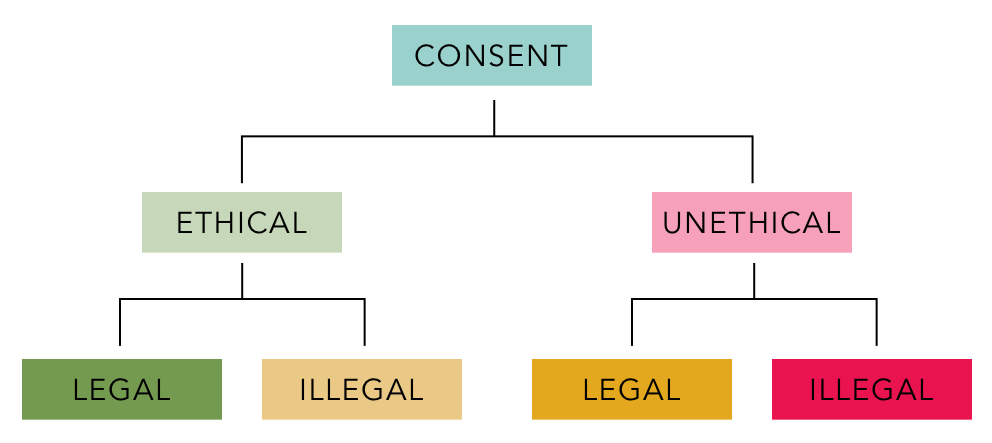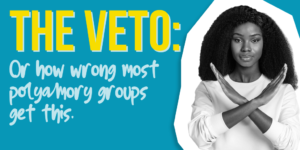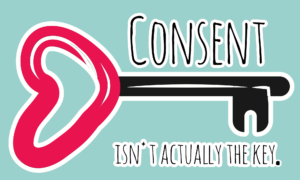CW: Non-consent, etc.
—
I got a message a while back that I thought could make a fascinating post:
There is a gap between behavior that is unkind and behavior that is unallowable (ie, illegal.) My question, is which camp does consent fall into? I have always had the understanding that saying your consent was violated was pretty much equivalent to saying you were raped. However, I see people use the term consent violation to describe behavior that doesn’t require getting consent. Initially I just assumed they were wrong, but I see it enough that I think perhaps I am wrong.
No one on peopleofwallmart.com consented to having their picture taken and being mocked on the internet. They don’t have to, our freedom of press gives people the right to publish stuff like that. At the same time, I think it’s in poor taste to do it. You said in a writing recently something about “consent to have my picture taken.” Well, you don’t generally need someone’s consent to photograph them, at least not in public. Perhaps we don’t mean the same thing when we talk about consent?
Consent is just a word, and words mean different things to different people. My concern is that if the meaning of consent becomes a fine line rather than a bright line then it becomes something that is debatable rather than something that the vast majority of people can agree on. Then it doesn’t really mean anything.
So, I see the point here.
There are many aspects of consent that are illegal. For good reason.
Rape, for example.
Not consent.
Also illegal.
However, just because something is technically legal, does not make it valid and ethical consent.
For example, if I ask you to put my hand down your pants, and you say, “No,” then I continue begging, pleading and cajoling until you give in and say, “Yes,” that is technically legal, and technically consent (You said “Yes!”).
It’s also crappy consent ethics. Because coercion.
Let’s take a look at the four end results as I can see them:

Ethical/Legal: Enthusiastic, informed consent, given freely, and also falls within the bounds of law. A-OK!
Ethical/Illegal: A blow job, consented to happily in some areas. Anal sex between two very happy and consenting men, in certain states. Prostitution between a happy prostitute and an enthusiastic client. I’m personally and ethically OK with all of these, despite their illegality.
I’ve been known to cross these boundaries myself on the regular. Heck, if you HIT anyone in the state of North Carolina, even with enthusiastic consent, you are breaking the law, for a person cannot legally consent to physical assault.
Unethical/Legal: As noted above. Coercion. Unenthusiastic consent. “Not a ‘No.'” To me, this is FAR worse than Ethical/Illegal consent. I’d rather run afoul of the law than of another person’s boundaries, myself.
I have crossed this boundary before and called myself out for it. I make every effort to never do this again.
Unethical/Illegal: This is where the shit hits the fan. No consent and crossing the lines of law. Rape. Sexual assault. And many others. No-go. Period.
So, that’s how I would classify them.
Consent, in my view, is an umbrella that includes legality and illegality, not the other way around.
Now, to this point:
Consent is just a word, and words mean different things to different people. My concern is that if the meaning of consent becomes a fine line rather than a bright line then it becomes something that is debatable rather than something that the vast majority of people can agree on. Then it doesn’t really mean anything.
YES.
Exactly.
This is exactly right. Which means that focusing as much as possible on the ethical means of getting consent is critical.
There are are some rules/ideas that many people can agree on, when it comes to consent. Some are debated or still being assimilated into society’s standards, like these:
A Key Point We Often Miss When Discussing Consent
Why Enthusiastic Consent Is My Minimum Standard
But consent rules don’t work exactly the same on every person. Which is why it is a fine line.
And that’s how it should be.
And that means that in order to be both ethical and legal (or flouting a few blue laws), you have to engage with a person, as an individual, as more than a checklist, and with more than an eye to JUST ticking off the requirements from a piece of paper.
And that’s OK, in my book.








